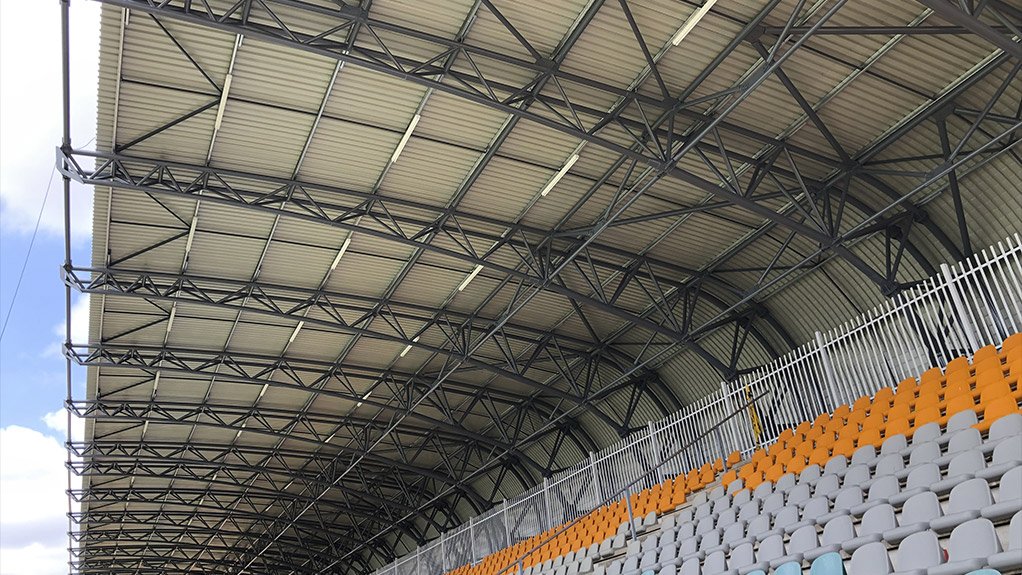South Africa and Africa more broadly are attempting to develop their economies through industrialisation and steel forms the basic material of choice for this economic transformation, says the Steel Tube Export Association of South Africa (Steasa) executive director Keitumetse Moumakoe.
This creates a tremendous need for training in the design, fabrication and construction of structures that use steel, he adds.
“The Southern African Institute of Steel Construction (Saisc) promotes such training at every level, by supporting the training at undergraduate and postgraduate levels. It has also supported several supervisory and vocational training initiatives and will continue to do so.”
Steasa’s collaboration with Saisc enables it to contribute meaningfully to industry matters pertaining to localisation and designation. It also provides input to tariff investigations by the International Trade Administration Commission of South Africa (Itac) and assists the South African Revenue Service (Sars) with import reference price determinations for the steel tube and pipe sector, Moumakoe explains.
Steasa members, in turn, benefit from the technical repository of steel knowledge which Saisc is a custodian of.
Steasa currently has 14 members, with three more companies to join during the current second half of the year. This is an increase in member companies from the previous year, with Moumakoe adding that, “membership is what guarantees the sustainability of Steasa and our service value offering has always been geared towards increasing membership through value”.
Future Aspirations
Steasa, as an export council charged with increasing locally manufactured tubular exports, primarily intends to foster closer collaborative agreements between the downstream steel tube and pipe industry and the primary industry.
It also aims to attain an export competi- tive cost of domestic hot rolled coil and an export rebate in each Southern African Development Community (SADC) country that will ensure that companies within this sector in the SADC region are competitive against their foreign competitors in the trade block.
The association aspires to be the go-to association for all South Africa-based manufacturers in the steel tube and pipe industry regardless of whether they are aspirant, emerging or experienced exporters.
“We recognise that, as export-focused manufacturing and trading organisations, it is now more crucial than ever that we pull together, enact intent and display the resilience required to re-grow our export markets.”
Steasa works closely with the technical team of Saisc to integrate the latest knowledge into the design and construction of tubes. One area of collaboration has been the promotion of design methodologies for concrete-filled tubes and pipes that are gaining traction in South Africa.
This method of construction increases the structural capacity of the tube at little cost while enhancing its resistance. Technological innovations, such as this one, are expected to support South Africa’s export capability for steel tubes and pipes, he says.
“We have always regarded ourselves as an inextricable part of the steel institute, although independent, and actively share and endorse Saisc’s commitment to the long-term prosperity of the steel construction sector.
“We engage and encourage industry stakeholders to take the necessary action that will stimulate growth for our industry while gauging our ability to compete globally using the quality and skills of our members.”
Industry
Steasa is one of 18 export councils that fall under the Department of Trade, Industry and Competition (DTIC). The association is in a public–private partnership (PPP) with the DTIC, with the explicit mandate of increasing value-added finished tubular product exports, says Moumakoe.
Under this PPP, Steasa is committed to the National Development Plan’s 2030 vision on value-added exports, which aims to ensure that exports of manufactured products increase by 6% a year towards 2030.
As such, the association engages regularly with the Gauteng Growth Development Agency, Sars, Itac, the Export Credit Insurance Corporation of South Africa and the Electrotechnical Group of Export Councils.
Subsequently, Steasa continuously encourages its members to strive for best international practices in quality, efficiency and competitiveness. This translates into investments and upgrades of existing manufacturing plants where the Fourth Industrial Revolution (4IR) is incorporated to various degrees, in line with best international practices.
The steel sector, including the steel tube and pipe subsector, has also been affected in terms of improving production efficiencies and competitiveness through investments in new production plant equipment that meets the prescripts of 4IR, Moumakoe highlights.
“Steel technical services and products provider SMS group – a world-renowned steel tube and pipe mill original-equipment manufacturer with which Steasa has a good working relationship – manufactures this type of 4IR equipment.”
As such, Moumakoe believes that companies in the steel construction sector are geared to meet the challenges of mechanisation and automation using technologically advanced optimisation strategies.






